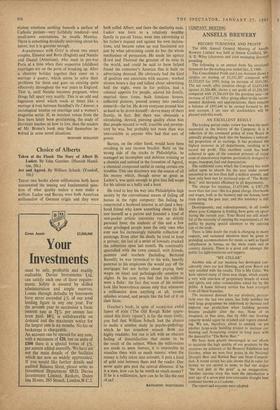Choice of Alberts
Art and Agyrol. By William Schack. (Yoseloff, 30s.)
THESE two books about millionaires both leave unanswered the teasing and fundamental ques- tion of what quality makes a man make a million. Lasker and Barnes were both American millionaires of German origin and they were
both called Albert; and there the similarity ends. Lasker was born to a relatively wealthy family in pre-oil Texas, went into advertising at his father's request and against his own inclina- tions, and became eaten up and fascinated not -just by what advertising could do but the whole mechanism of persuasion. He made his agency (Lord and Thomas) the greatest of its time in the world, and could be said to have helped found the consumer's America that is built on advertising demand. He obviously had the kind of qualities one associates with success: worked sixteen hours a day and talked about advertising half the night, went in for politics, had a colossal appetite for people, adored his family, married three times, built fabulous houses, collected pictures, poured money into medical research—the lot. He drove everyone around him as hard as he drove himself—drove many of them frantic, in fact. But there was obviously a stimulating, shrewd, piercing quality about him that people reacted to well; irascible and peremp- tory he was, but probably not more than was unavoidable in anyone who had that sort of power.
Barnes, on the other hand, would have been revolting in any income bracket. Born on the wrong side of the tracks in Philadelphia, he managed an incomplete and dubious training as a chemist and assisted in the invention of Agyrol, a chemical compound useful in curing certain eye troubles. This one discovery was the source of all his money which, though never as great as Lasker's, was quite enough to give him full scope for his talents as a bully and a boor.
He tried to buy his way into Philadelphia high society by the conventional means of falling off horses in the right company; this failing, he resurrected a boyhood interest in art (and a boy- hood friend whp knew something about it). He saw himself as a patron and founded a kind of vest-pocket artistic university run on strictly personal lines; the students of this and a few other privileged people were the only ones who ever saw his increasingly valuable collection of paintings. Even after his death, he tried to keep it private; the last of a series of lawsuits cracked the collection open last month. He continually quarrelled with the town council, with friends, painters and teachers (including Bertrand Russell); he was tyrannical to his wife, heavily paternal to his employees (he would pay off the mortgages but not bother about paying their wages on time) and pathologically sensitive to slights. In his case, you feel that his millions were a fluke: the fact that some of his actions look like benevolence means only that whenever a millionaire does anything at all, money splashes around, and people like the feel of it on their faces.
Gunther's book, in spite of occasional awful lapses of style (The Old Rough Rider appre- ciated this lively riposte'), is far the more lively; you feel that William Schack had the chance to make a sombre study in psycho-pathology which he has somehow missed. Both are highly readable; but one is left with an obscure feeling of dissatisfaction that seems to be the result of the subject. When the millionaires are made to seem human, it is impossible to visualise them with so much money; when the money is fully taken into account, it puts a kind of gold mist between them and the reader. One never quite gets past the central dilemma: if he is a man, how can he be worth so much money? If he is a millionaire, how can he be like the rest of us?
KATHARINE WHITEHORN










































 Previous page
Previous page